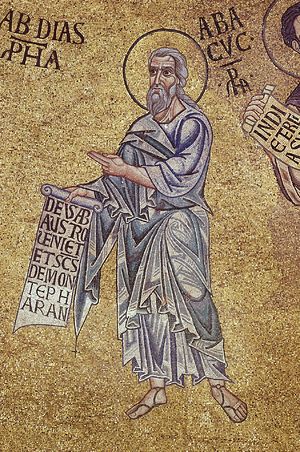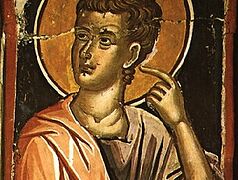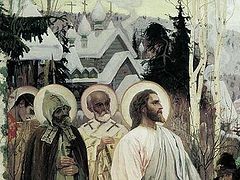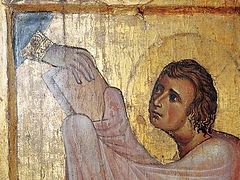 Prophet Habakkuk This can also be found on the pages of the Old Testament. Except that the Synodal Translation and the Church Slavonic Bible do not say anything about the Psalm of Habakkuk. Although they do contain the book of the Prophet Habakkuk. And it ends in the third chapter with a prayer that is supposed to be sung. This is that psalm. There is no doubt that it was once sung in the Jerusalem Temple. Let’s look inside the Greek Septuagint, where the lengthy prayer of Habakkuk is divided by a characteristic liturgical rule: antiphon. It is issued for temple cantors.
Prophet Habakkuk This can also be found on the pages of the Old Testament. Except that the Synodal Translation and the Church Slavonic Bible do not say anything about the Psalm of Habakkuk. Although they do contain the book of the Prophet Habakkuk. And it ends in the third chapter with a prayer that is supposed to be sung. This is that psalm. There is no doubt that it was once sung in the Jerusalem Temple. Let’s look inside the Greek Septuagint, where the lengthy prayer of Habakkuk is divided by a characteristic liturgical rule: antiphon. It is issued for temple cantors.
This psalm is still sung in the New Testament Church, if only in its individual verses. As a refresher, I will provide here only a few lines from the Psalm of Habakkuk: O Lord, I have heard thy speech, and was afraid... God came from Teman, and the Holy One from mount Paran. Selah. His glory covered the heavens, and the earth was full of his praise (Habakkuk 3:1-3). These lines sound familiar to many Orthodox people.
On Pascha, we hear at church how the divinely speaking Habakkuk kept his divine watch. He stayed spiritually awake while others were asleep. What was he waiting for, what did he guard? In fear and hope, he was waiting for God Who came from Teman, and he saw His glory covered the heavens. In the meantime, the darkness deepens around the prophet. Evil deeds were being plotted and done. And the prophet was tormented by all that.
So he turned to God with a sorrowful lament: O Lord, how long shall I cry…unto thee of violence, and thou wilt not save! Why dost thou shew me iniquity, and cause me to behold grievance? (Habakkuk 1:2-3). In modern times, people feel the same way and understand the prophet’s agony.
The Lord comforted His servant. But no sweet assurances issue from His mouth: “Not everything is as bad as you think. Be patient, and things will work out. A brighter future is just around the corner.” The Lord knew of the tribulations of those days and foresaw an even greater misery. This is what He revealed to the prophet: The people of God are to survive the rise and invasion of the colossal Chaldean Empire. The Chaldeans gathered strength. How could they fight them off? The arrogant and cruel Chaldeans deify power; whoever has the power is right and the strongest tells others how to live.
However, the Chaldeans have got it all wrong. The truth is never on their side. Their hopes in the power of their enormous militant state will all be in vain in the end. Likewise, the hopes of heathens to receive help from their gods are just as futile. The dumb idols (“eidola kopha” in Greek; Habakkuk 2:18) are unable to respond to the true God, just as they are unable to resist the mighty hand of God.
God will reveal His power and the earth will see His Last Judgment. This is that dreadful sight the prophet Habakkuk sees as he admits, And I trembled in myself (Habakkuk 3:16). The Lord does not promise His people infinite placid satiety, but that He will sustain them in their hour of need. Thus, they will be able to pass through all terrible trials.
In the thick of the most devastating storms, the just shall live by his faith (in Greek: zisete; in the Slavonic Bible, see Habakkuk 2:4; in Greek, Habakkuk 2:5). Faith in God saves us from peril. Our trust and loyalty to God will help us to survive and remain human in the days of deadly peril. Here is the remedy for warding off evil spirits.
To be with God and hold on to His hand is far more important that to have great wealth and live contentedly
The prophet Habakkuk uses it as his remedy. And it gives strength to the prophet. A witness of the raging of sin and injustice, the upheaval of societal norms, the destruction of households and vineyards, the depletion of herds of sheep, the prophet is filled with horror at what he sees, but then—praises to God suddenly flow from his lips. Despite his distress and fear, he finds his secure and steadfast footing: Yet I will rejoice in the LORD... the LORD GOD is my strength (Habakkuk 3:18-19). To be with God and hold on to His hand is far more important that to have great wealth and live contentedly.



